CBC HISTORY
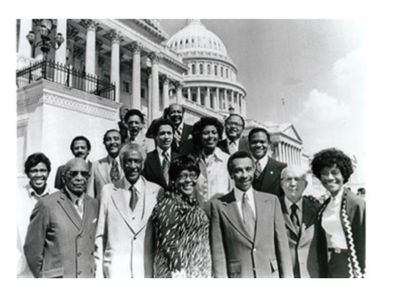 The Congressional Black Caucus (CBC) was established in 1971 to put forth policy and legislation that ensured equal rights, opportunity, and access to Black Americans and other marginalized communities. It is a non-partisan body made up of African-American members of Congress.
The Congressional Black Caucus (CBC) was established in 1971 to put forth policy and legislation that ensured equal rights, opportunity, and access to Black Americans and other marginalized communities. It is a non-partisan body made up of African-American members of Congress.
The leadership of the Caucus is under the guidance of Congressman Steven Horsford. Over the past five decades, the Congressional Black Caucus (CBC) has remained steadfast in its dedication to empowering citizens and addressing their legislative concerns through a comprehensive policy agenda. This commitment involves advocating for strengthened protections for workers, enhanced access to full and fairly compensated employment, increased opportunities for minority-owned businesses through improved access to capital, contracts, and counseling, and advancing U.S. foreign policy initiatives in Africa and other nations aligned with the fundamental right of human dignity.
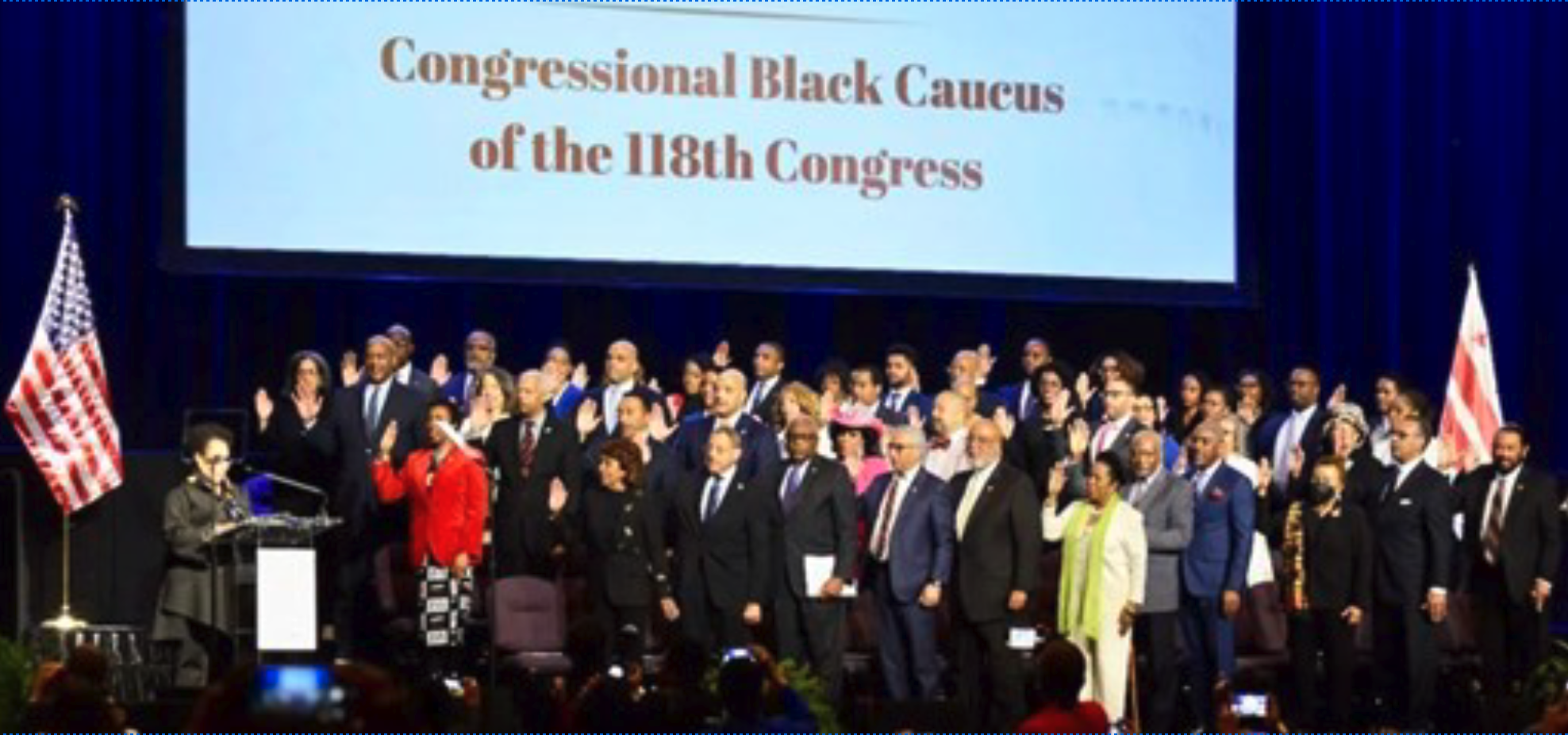 In the current 118th Congress, the CBC boasts a historic representation with 58 members in both the U.S. House of Representatives and the U.S. Senate. These members collectively represent more than 82 million Americans, constituting 25.3 percent of the total U.S. population.
In the current 118th Congress, the CBC boasts a historic representation with 58 members in both the U.S. House of Representatives and the U.S. Senate. These members collectively represent more than 82 million Americans, constituting 25.3 percent of the total U.S. population.
Notably, they also represent over 18 million African -Americans, accounting for 41 percent of the total U.S. African-American population. Additionally, the CBC holds significant sway within the House Democratic Caucus, representing almost a quarter of its members.
The CBC actively engages at the highest echelons of Congress, with key members serving in leadership roles. Representative Hakeem Jeffries leads the House Democratic Caucus, Representative James E. Clyburn serves as Assistant Democratic Leader and Representative Barbara Lee co-chairs the House Democratic Steering and Policy Committee. Moreover, five CBC members chair full House committees, and 25 members serve as chairs on House subcommittees.
Despite its predominant Democratic membership, the CBC’s founding vision emphasized a non-partisan approach. This commitment is reflected in a rich history of bipartisan collaboration, with members hailing from both the Democratic and Republican parties.
As articulated by founding member Rep. William L. Clay, Sr., the CBC operates with the understanding that interests are permanent, while political affiliations may vary: “Black people have no permanent friends, no permanent enemies…just permanent interests.”
THE LEADERSHIP CONSORTIUM'S EVOLUTION: A TWO-DECADE JOURNEY WITH THE CONGRESSIONAL BLACK CAUCUS
In the early 2000s, Michael Kelly, formerly a Senior Policy Advisor to Phoenix Mayor Skip Rimsza, embraced the Mayor’s leadership philosophy emphasizing staff involvement in local and national initiatives being good for Phoenix and the greater good of Arizona. Inspired by this vision, Kelly continued his engagement with the Congressional Black Caucus (CBC) even after leaving the Mayor’s office. In
20 14, propelled by the support of then-Councilwoman (now Phoenix Mayor) Kate Gallego, Kelly, who chaired her Multicultural Advisory Council, assumed the mantle of leading Arizona’s inaugural delegation to the CBC. Spearheading this effort under the aegis of The Leadership Consortium (TLC), a non-profit of which he was the President, Kelly sought support to facilitate the delegation’s attendance at the CBC.
14, propelled by the support of then-Councilwoman (now Phoenix Mayor) Kate Gallego, Kelly, who chaired her Multicultural Advisory Council, assumed the mantle of leading Arizona’s inaugural delegation to the CBC. Spearheading this effort under the aegis of The Leadership Consortium (TLC), a non-profit of which he was the President, Kelly sought support to facilitate the delegation’s attendance at the CBC.
In 2002, just a few years after its inception in 1999, TLC obtained 501(c)(3) status, thanks to a development grant from Bank of America. Originally organized for charitable, scientific, and educational purposes, TLC primarily focused on initiatives within the local African American community. The organization, however, evolved into a multicultural entity with a mission to develop community leaders among African Americans and other underrepresented ethnic minority groups. Over the past decade, TLC has consistently orchestrated the Arizona delegation’s participation in the CBC, transcending political affiliations to foster collaboration among diverse entities. This annual endeavor has grown exponentially, drawing participants from universities, community colleges, political organizations, non-profits, corporations, and concerned citizens. The delegation mirrors a diverse cross-section of Arizona, creating a dynamic platform for reciprocal edification.
TLC’s mission to cultivate leaders of color aligns seamlessly with its role in enabling hundreds of individuals, irrespective of background, to engage with the CBC. This symbiotic relationship has proved mutually enriching—the CBC gains exposure to Arizona’s best and brightest Black individuals, while the Arizona delegates partake in conferences and events hosted by the foremost Black leaders in America.
In essence, The Leadership Consortium’s journey over the past two decades stands as a testament to its commitment to leadership development, multicultural engagement, and the facilitation of meaningful connections through its pivotal role in the Arizona delegation to the Congressional Black Caucus.
HEROZONA BRUNCH - HISTORY OF GEORGIA BROWN’S LUNCHEON
The Greater Phoenix Convention and Visitors Bureau (GPCVB), established in 1969 as a department of the City of Phoenix, was pivotal in promoting Phoenix as a prime destination for meetings and conventions. The original Phoenix Civic Plaza, inaugurated in 1972, underwent significant developments, including the construction of the South Building in 1985 and interior renovations in 1996.
Years later, the GPCVB, now known as Visit Phoenix, expanded its outreach by establishing a sales and marketing office in Washington, DC. This office covered a broad territory, encompassing Maryland and Virginia, and collaborated with hotel and resort sales. The primary objective was to position Greater Phoenix as the preferred destination for meetings and conventions, serving as a central point of contact for conventions. This involved coordinating business leads, proposals, bid presentations, and overseeing travel and promotional activities within the Washington DC market. The strategic approach included participation in tradeshows, targeted client events, and specialized sales missions.
To foster relationships and attract potential clients, the GPCVB organized luncheon meetings at Georgia Brown’s restaurant. These gatherings were particularly significant during the Congressional Black Caucus Annual Legislative Conference, providing a platform to engage with decision-makers and influencers. However, as the GPCVB evolved, it ceased conducting luncheons at Georgia Brown’s.

On September 28, 2022, the Phoenix Convention Center & celebrated 50 years since its initial grand opening in 1972.
The Phoenix Convention Center, initially established in the mid-80s and expanded in the mid-90s, underwent a significant $600 million expansion in 2008, tripling its size and reopening as the Phoenix Convention Center.
This expansion enabled the hosting of national-level conventions, trade shows, and events. Since then, it has welcomed around 2.7 million attendees, generated over $300 million in annual visitor spending, and played a crucial role in the downtown landscape. With nearly one million square feet of rentable space and a dedicated team of 250+ employees, the Phoenix Convention Center continues its commitment to excellence, contributing significantly to the local economy.
In the early 2000’s, in an effort to boost tourism in Arizona, Michael Kelly assumed the role of Chairperson and Co-Founding board member, alongside Robert Van Arlen, for the Multi-Cultural Affairs Council of the Greater Phoenix Convention & Visitors Bureau. Kelly and Van Arlen were tasked with actively recruiting multicultural conventions and visitors to Arizona and Phoenix, the council also spearheaded sensitivity training initiatives for members of the hotel and motel industry. Their collaborative efforts proved highly successful, resulting in the recruitment of over 100,000 convention and conference attendees, translating to a significant economic impact of more than $127 million for the state of Arizona.
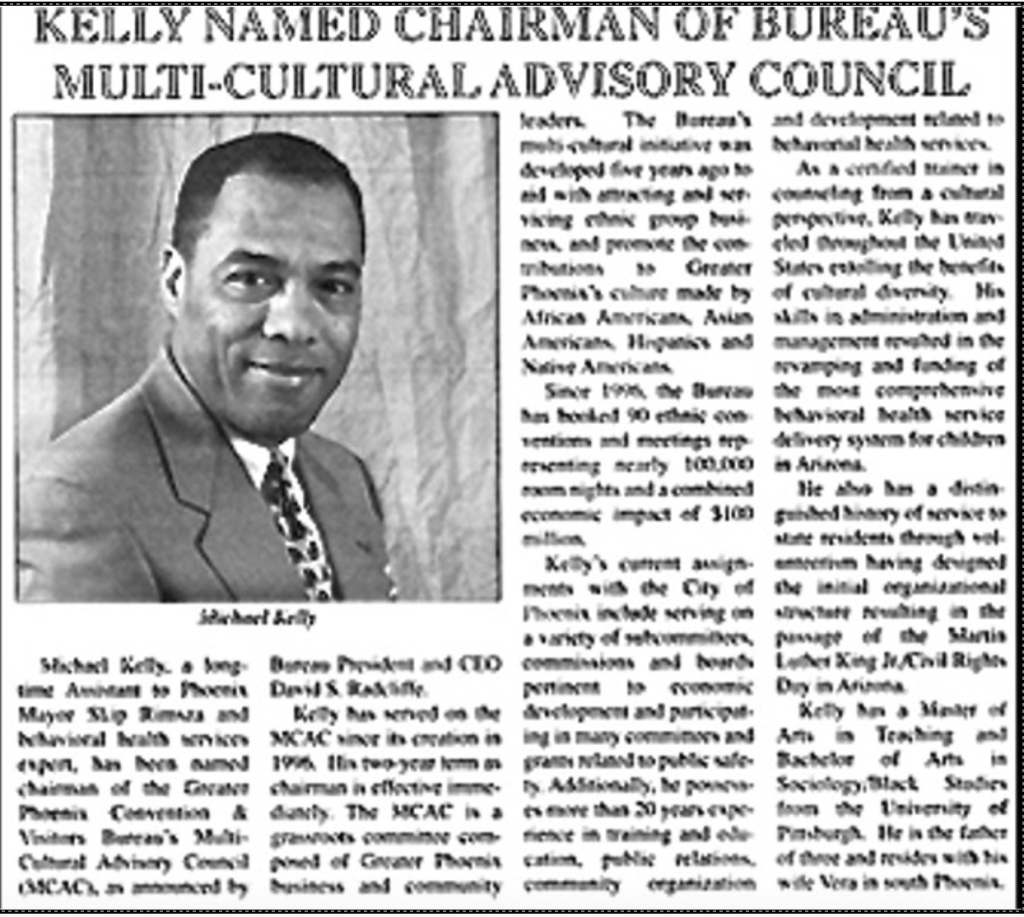

In summary, the HeroZona organization recognizing the value of such engagements, took up the mantle from the GPCVB and continued the tradition of hosting its luncheon at Georgia Brown’s. The transition to HeroZona’s involvement underscores the ongoing commitment to cultivating relationships and promoting Greater Phoenix within the dynamic landscape of the Annual Congressional Black Caucus. 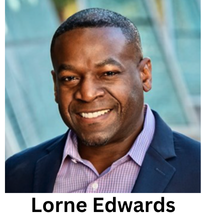 As Chief Sales Officer of Visit Phoenix, Lorne Edwards sets and guides the overarching sales and destination services strategic initiatives and operational competencies of the DMO. Edwards is responsible for positioning Greater Phoenix as the premier global destination for meetings, events, and leisure travel visitation.
As Chief Sales Officer of Visit Phoenix, Lorne Edwards sets and guides the overarching sales and destination services strategic initiatives and operational competencies of the DMO. Edwards is responsible for positioning Greater Phoenix as the premier global destination for meetings, events, and leisure travel visitation.
He has served on the American Society of Association Executives Industry Partner Alliance Board, DI’s Convention Sales & Services Committee, and its Diversity Equity and Inclusion Committee, was named to the U.S. Travel Association’s Inaugural Leadership Program earlier this year and sits on the University of Arizona’s Health Sciences Community Council. Edwards was also a founding member of Association Forum’s Healthcare Collaborative which has heightened the reputation of Phoenix as a world-class hub for hosting national healthcare and scientific conferences. Edwards has held several leadership roles at Visit Phoenix including most recently Sr. Vice President of Sales & Destination Services. Additionally, Edwards spent over 16 years with Hyatt Hotels Corporation in sales leadership roles in Boston, Denver, Atlanta, and Orlando. A native of Antigua, West Indies, he received a Bachelor of Science degree in Business Administration and Hospitality Management from the University of Central Florida. Edwards has been a supporter of TLC and our participation in the CBC for many years.
SKY HARBOR INTERNATIONAL AIPRORT
SKY HARBOR INTERNATIONAL AIRPORT, Inaugurated with Terminal 1 in 1952, emerged as a cutting-edge facility, serving airlines like American Airlines, Frontier, Western, and TWA. The terminal, hosting aircraft such as Douglas DC-3s and DC-4s, as well as Lockheed Constellations, was a pinnacle of modernity. As demand surged, Terminal 2 opened in the 1960s, aiming to accommodate traffic until 2000. However, escalating passenger numbers mandated Terminal 3’s construction, leading to the 2020 closure of Terminal 2 after 58 years of service.
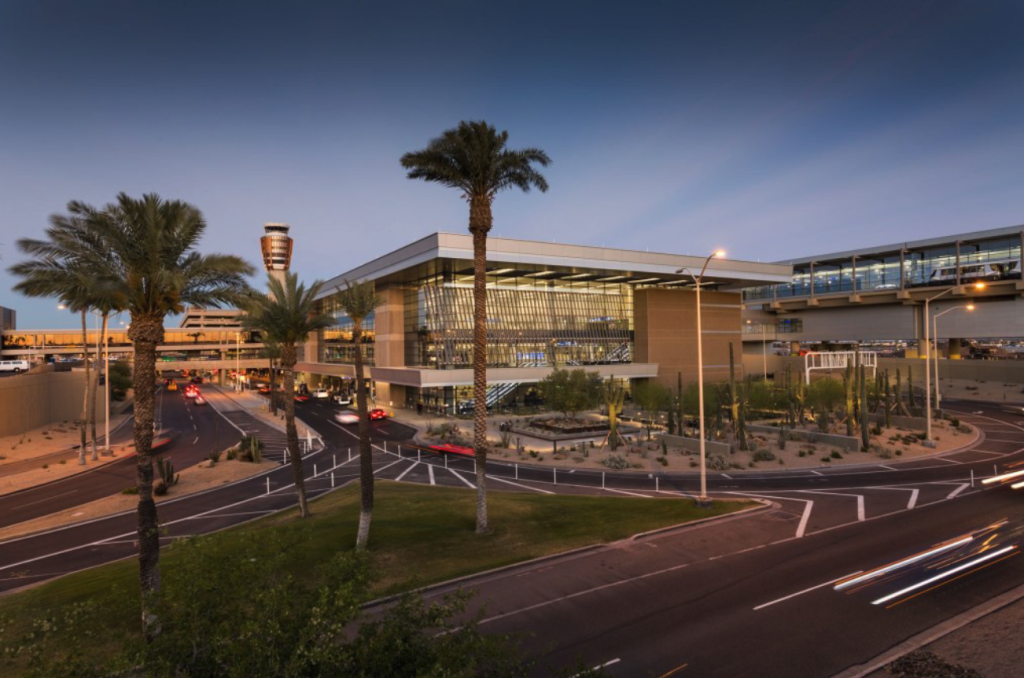 The PHX Sky Train, operational since 2013, is an automated people-mover connecting the 44th Street and Washington Light Rail station to Sky Harbor’s East Economy Parking, spanning Terminals 4 and 3. In 2022, Phase 2 extended its reach to the Rental Car Center. Despite challenges in 2021, Phoenix Sky Harbor International Airport remains one of the world’s busiest, ranking 8th in the U.S. and 22nd globally for landings and takeoffs. As Arizona’s largest airport, it functions as a key hub for American Airlines, with Frontier Airlines and Southwest Airlines also operating from the facility.
The PHX Sky Train, operational since 2013, is an automated people-mover connecting the 44th Street and Washington Light Rail station to Sky Harbor’s East Economy Parking, spanning Terminals 4 and 3. In 2022, Phase 2 extended its reach to the Rental Car Center. Despite challenges in 2021, Phoenix Sky Harbor International Airport remains one of the world’s busiest, ranking 8th in the U.S. and 22nd globally for landings and takeoffs. As Arizona’s largest airport, it functions as a key hub for American Airlines, with Frontier Airlines and Southwest Airlines also operating from the facility.
J.D. Power’s 2023 North America Airport Satisfaction Study placed Sky Harbor at No. 13 among mega airports, reflecting a slight drop from the previous year. Although the customer satisfaction rating increased, Michael Taylor of J.D. Power noted that this shift suggests advancements by other airports rather than a decline in Sky Harbor’s service quality.
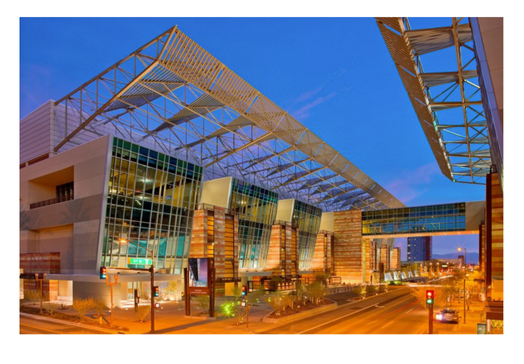 The Phoenix Convention Center underwent a $600 million expansion in 2008, tripling its size and enabling the hosting of national-level events. Since then, it has welcomed 2.7 million attendees, generating over $300 million in annual visitor
The Phoenix Convention Center underwent a $600 million expansion in 2008, tripling its size and enabling the hosting of national-level events. Since then, it has welcomed 2.7 million attendees, generating over $300 million in annual visitor
spending. With nearly one million square feet of rentable space and 250+ employees, it continues to contribute significantly to the local economy. The convention center is a venue for large, high-profile events like the Super Bowl Experience, and it will host the NCAA Final Four in April 2024.
Bookings for events in 2023 and 2024 are exceeding pre-pandemic averages, with estimated direct spending of $572 million in 2023 and $549 million in 2024. Phoenix officials are considering building an entertainment district around the convention center to further boost economic activity.
